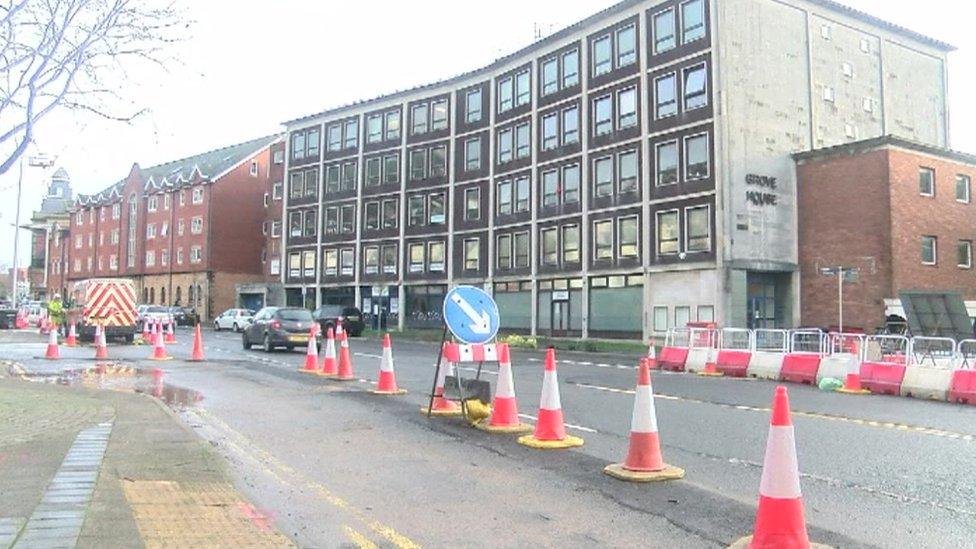Disability health centres 'putting safety at risk'
- Published
Amy Watkins says the centre's location puts her safety at risk due to a narrow path
Disabled people are risking their safety when attending Wales' health assessment centres due to their poor locations, a woman has said.
Amy Watkins, 31, from Cwmbran, Torfaen, uses a wheelchair and said the sites of some centres were "hard to believe".
Campaigners said some disabled people have missed out on thousands of pounds worth of benefits due to the issue.
The Department for Work and Pensions (DWP) said people can request a home visit or recover transport costs.
Assessments carried out at the centres determine whether people with disabilities and chronic illnesses are eligible for benefits.
A campaign group, the Disability Advice Project, criticised the location of centres in Pontypridd, Bridgend, Cardiff and Swansea, and also has concerns across the rest of Wales.
It said some disabled people may have missed out on benefits as it is "virtually impossible" for some people to access centres.
At the Pontypridd centre, the group said the closest car park to the health assessment centre had no pedestrian access and routes in and out of the building were too steep for wheelchair users or people with impaired mobility.
Ms Watkins said: "I wouldn't put myself at risk, I would request another location or home visit because I don't think it would be fair to put myself through the stress and anxiety of having to get to a building which I don't know is accessible."

The health assessment centre in Swansea is on the fourth floor of a building
Some of the routes to assessment centres also open out on to main roads with no protective barriers, as well as having poor signage, uncontrolled road crossings and a lack of dropped kerbs.
Tony Crowhurst, from the Disability Advice Project, said the centres should be based in "out of town locations with good public transport".
He said he was advised to park illegally by one centre employee, adding: "At the Pontypridd assessment centre we were told it would be alright to park in the bus lane, and dismount wheelchair users from that point.
"At Bridgend we were told it would be okay for us to park in the vehicle test centre, without asking any permission from anybody else, the alternative to that was a quarter of a mile walk," he said.
"They weren't understanding the needs of disabled people, they were telling us on the one hand to go to a car park that is virtually inaccessible, and on the other hand, to break the law."
At the Bridgend centre, campaigners have said the car park is too far away from the centre, the road is too steep for people with impaired mobility and there is an "extremely short" four-second pedestrian crossing time at traffic lights near the centre.
The group said the ramps to the centre "exceed the recommended lengths of slopes that are accessible by independent wheelchair users" and there was no "rest" area on the ramps.
The group also said the Swansea centre, which is on the fourth floor of a building, should not be used as a wheelchair user could become stuck if the lift fails.
None of the centres in Wales have advice about how disabled people can reach them, despite many of their visitors having disabilities, chronic illnesses or health issues, they said.
'Severe financial difficulty'
The DWP said it made decisions on paper evidence whenever it could do so, and took individual needs into consideration when arranging appointments.
"Claimants can recover the cost of transport to their appointment but if anyone is unable to travel to an assessment centre, they can request a home visit," a spokesman said.
However some people have found it difficult to get home appointments.
Pauline Jones, director of the Disability Advice Project, said disabled people were missing out on benefits because they were unable to make appointments.
She said: "We've had many people who've lost benefits as a result of not being able to attend.
"The largest one we've had as a back payment is £15,000. She went almost a year without money, the problem is during that time she had no money, she had bailiffs, she just about managed to hang on to her property, so is in quite severe financial difficulty."
- Published14 November 2019

- Published25 October 2019

- Published23 October 2019

- Published8 November 2016

- Published19 April 2019
